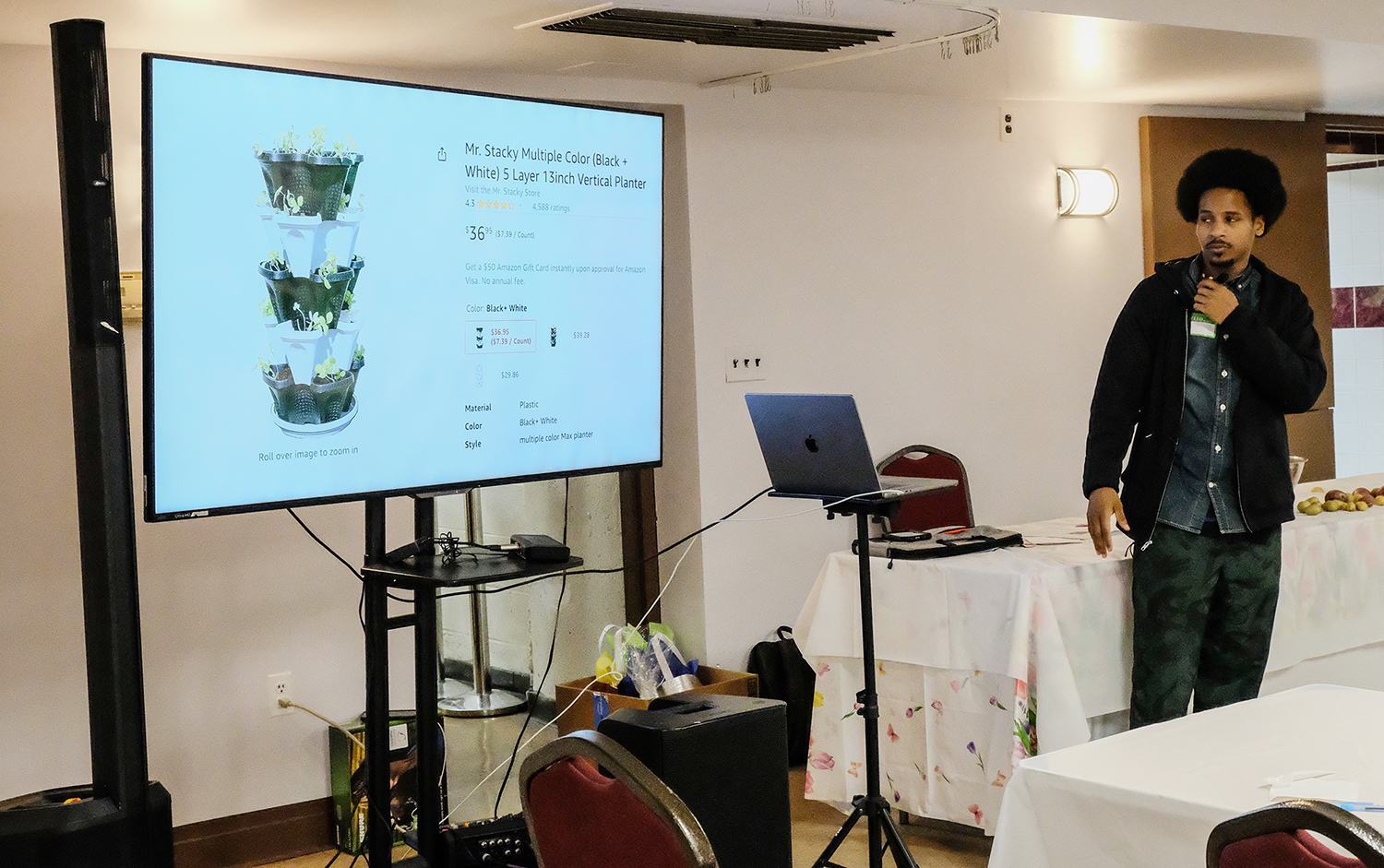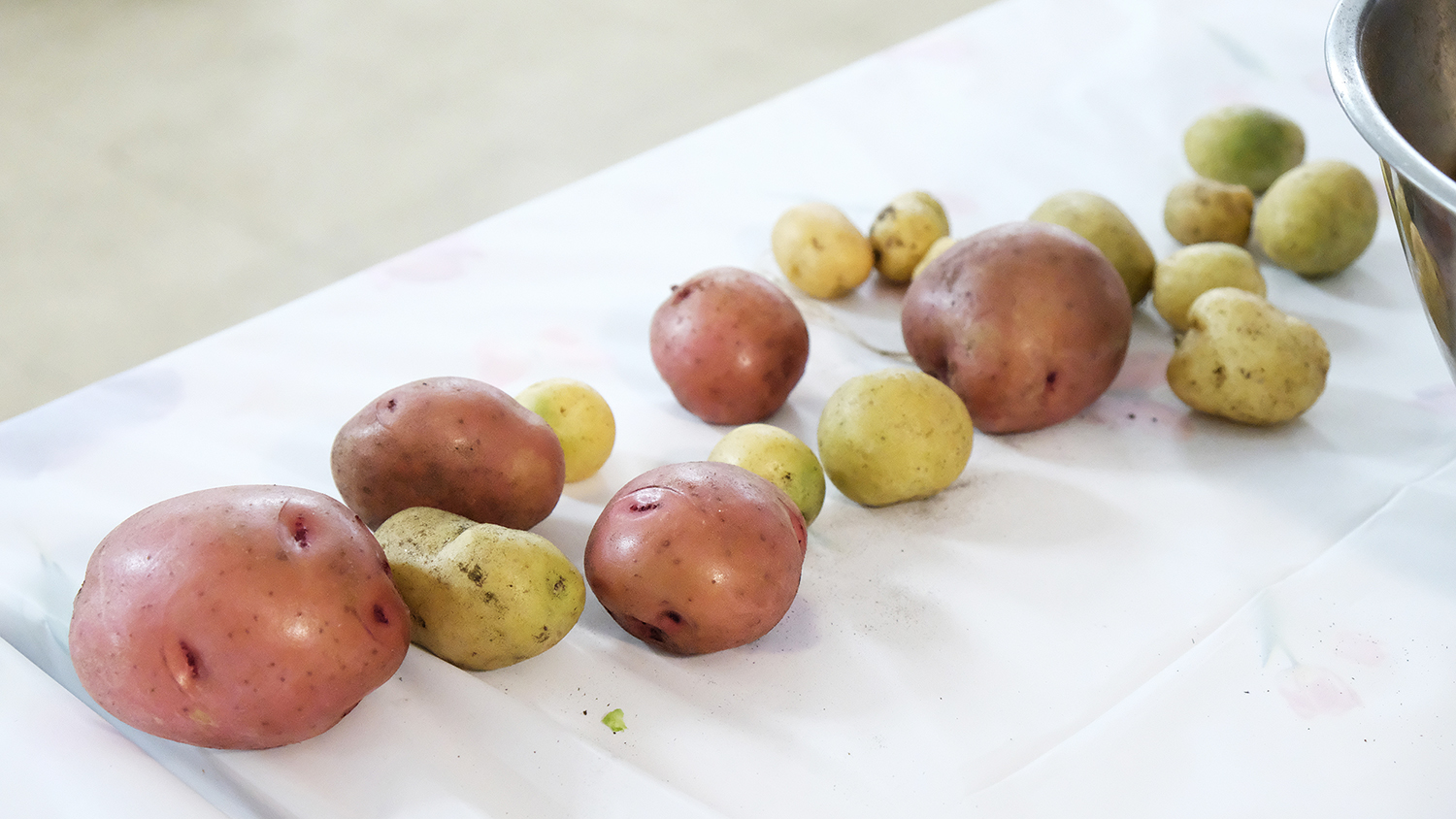NEW YORK (RNS) — On a recent Sunday afternoon, staff members of Harlem’s Ephesus Seventh-day Adventist Church traded their Saturday church clothes for aprons as they prepared to host the church’s vegan cooking class.
Throughout April, congregants and Harlem neighbors were invited to multiple Sunday afternoon events at the church — which, as part of the Seventh-day Adventist tradition, holds services on Saturdays — to learn to cook savory plant-based recipes, get tips on growing vegetables in urban gardens and hear advice on how to avoid processed foods.
The initiative, imagined by the church’s health ministry, was named “Taste & See” as a nod to a verse in Psalm 34, proclaiming: “Taste and see that the Lord is good.”
“We’re showing people that you can eat healthy and satisfy your taste buds,” said Karen Phipps, director of the church’s health ministry.
The church created the ministry two years ago to promote the Seventh-day Adventist lifestyle. Since its founding in the early 1860s, the Seventh-day Adventist Church has encouraged believers to give their bodies the best treatment as they are seen as the temples of the Holy Spirit.
The church’s dietary recommendations are inspired by the biblical Book of Leviticus, which prohibits eating foods deemed “unclean,” including pork, rabbits and shellfish. It also deters members from consuming alcohol and other harmful substances. Many Adventists, as many as 40% according to some studies, have adopted a plant-based diet to comply with the church’s nutritional rules.
Participants take notes and listen during a presentation on urban gardening as part of a Taste & See class. (Courtesy photo)
Phipps herself became a vegan 20 years ago after dealing with grave health problems. When she found out she had developed precancerous cells, she decided to pay more attention to her diet. Through the Health Ministry, she shares her passion for food, veganism and health with members of her congregation.
The Health Ministry also offers spin classes and takes the congregation on glamping weekends, or “glamorous camping.”
On its website, the church states that it “believes that by fostering a healthier environment, we are not only adhering to God’s plan but also enhancing the quality of life for everyone in Harlem.”
Its efforts to promote a healthy lifestyle benefit the whole Harlem community, which is particularly underserved in the area of nutrition. The historically Black neighborhood counts fewer supermarkets selling fresh vegetables than more affluent parts of the city and is often referred to as a “food desert.” According to the New York City Health Department, the obesity rate in Central Harlem in 2015 was 28%, compared with 24% overall in New York City.
For 30 years, the church has hosted a health fair where the community can receive free health screenings, consultations and advice.
Elliot Phipps leads a presentation on urban gardening during the Taste & See class. (Courtesy photo)
“We bring a lot of health care professionals and natural focus professionals into the area so people can walk around, talk and learn,” said Phipps.
In an effort to address the community’s economic concerns, the “Taste & See” event also featured affordable recipes with good ingredients — ingredients that qualify for “WIC dollars,” or stipends from the Special Supplemental Nutrition Program for Women, Infants, and Children, Phipps noted.
“We invite the community to participate, and we try to show economical ways of eating that you can serve your family and give them healthy food and not break the budget,” said Phipps.
That day, the conference room in the church’s basement was turned into a makeshift kitchen for the event. Nancy Rutledge, a member of the health ministry, kick-started the event by praying for “healthier food habits.”
On the large table at the front of the room, the team prepared a one-pan Mexican quinoa, a veggie stir-fry, and crabby patties inspired by SpongeBob SquarePants.
As they were served samples to taste, the 50 participants who came with notepads in their hands asked the cooks about the benefits of each ingredient.
The staff gave tips on preparing a homemade “Sofrito,” a Puerto Rican spice blend, to avoid buying a ready-made one and offered alternatives to salt-filled chili powders.
Each 15-minute recipe ended with a debriefing session about what participants had learned through it.
The end of the event focused on a popular trend: urban gardening. For an hour, Phipps’ son, Elliot, shared with the group his secrets for growing a 5-pound bag of potatoes in his New York City garden.
The younger Phipps explained that regardless of what people think, it’s not difficult to grow fresh and healthy vegetables in an urban setting. Participants registered in a lottery to win a goodie bag containing an urban gardening starter pack.
One of the main goals of these sessions, explained Phipps, is to raise awareness on the dangers of pesticides and other potentially harmful products, including some generally thought of as safe. She hopes the sessions could help some participants adopt a new lifestyle free of all chemicals. “I look for all the chemicals in foods, and I avoid them as much as I possibly can,” she said.
For May, the church’s health ministry is promoting a “50 miles” challenge, in which congregants are encouraged to walk, run, swim, hike, bike or kayak for 50 miles over the course of the month.
Discover more from CaveNews Times
Subscribe to get the latest posts sent to your email.


























![Exploring the Serene Beauty of Nature: A Reflection on [YouTube video title]](https://cavemangardens.art/storage/2024/04/114803-exploring-the-serene-beauty-of-nature-a-reflection-on-youtube-video-title-360x180.jpg)





























